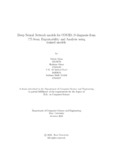Deep neural network models for COVID-19 diagnosis from CT-Scan, explainability and analysis using trained models
Abstract
The world is going through a severe viral pandemic which is caused by COVID-
19. People infected with this virus, experience severe respiratory illness. The virus
spreads through particles of saliva or droplets from an infected person. There are
ways of identifying COVID-19 based on the symptoms such as fever, dry cough,
tiredness, but these symptoms are similar to other existing viral or respiratory infections.
There is no quick approach in diagnosing if a patient is infected or not. To
overcome the drawbacks mentioned, a faster diagnosis is needed which leads us to
the objective of this study. we intend to construct a diagnostic approach that uses
pre-existing data mostly on COVID-19, as well as take datasets from other respiratory
diseases. We will apply deep learning models to the acquired datasets enabling
us to obtain more accurate and efficient results. We aim to use Deep Neural Network
models namely Convolutional Neural Network models (CNN) such as VGG19,
Inception v3, MobileNetV2, and ResNet-50. These four models are pre-trained and
they classify the CT-Scan images based on the trained learning approaches. The
result of each model is compared among the models to get faster and more accurate
results. This paper also proposes a "Hybrid" model which is composed of a
Convolutional Neural Network (CNN) and a Support Vector Machine (SVM). The
Hybrid Model is shallow and just as accurate as the pre-trained models. In light
of the exactness of the result and the minimal measure of time needed for image
classi cation, we will be able to diagnose more accurately and effectively.

